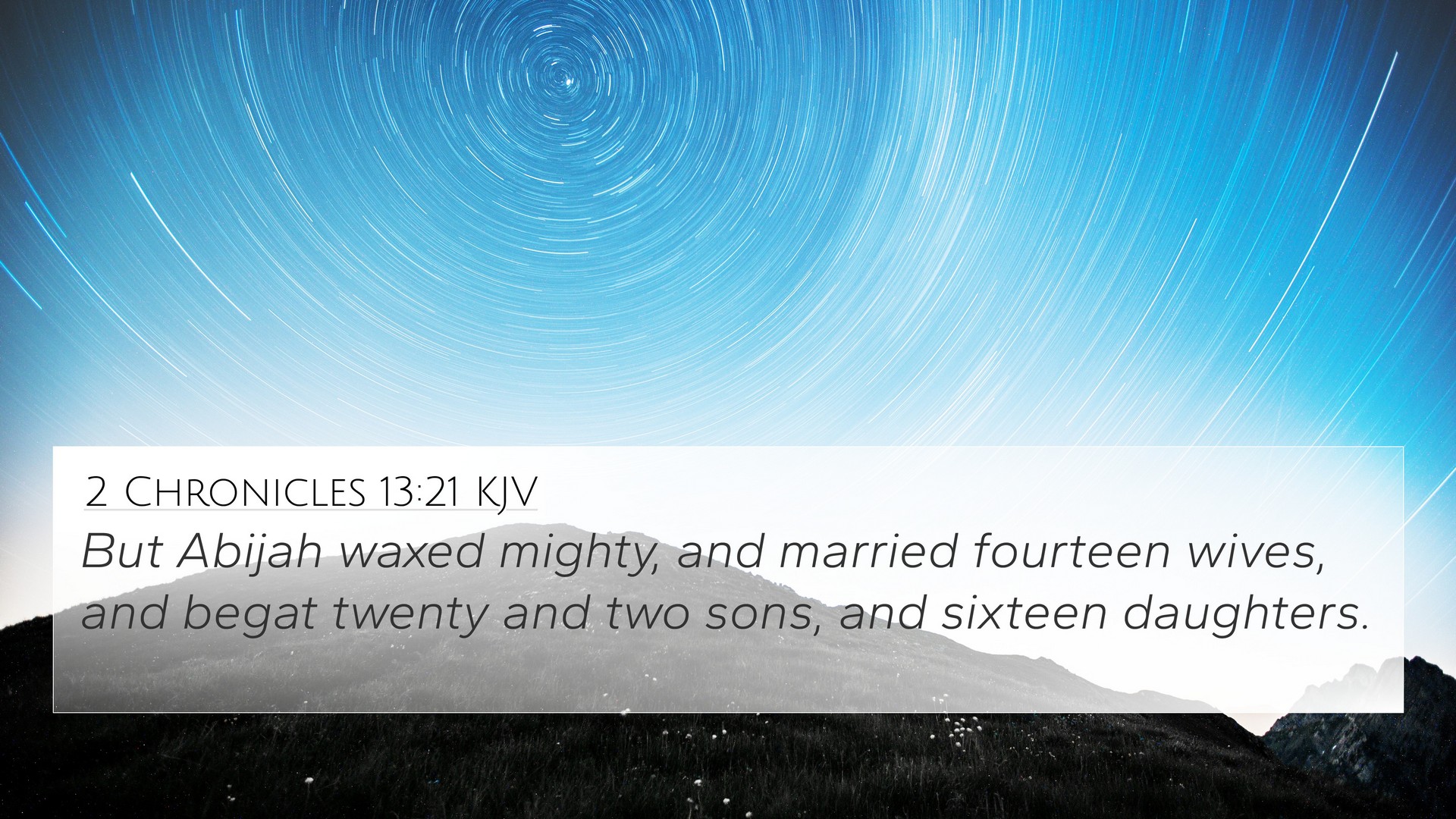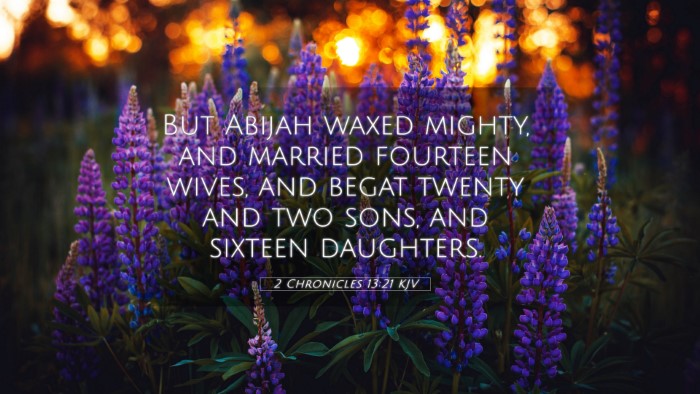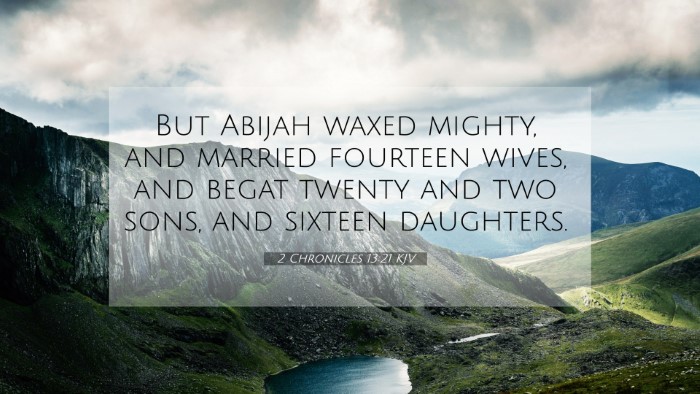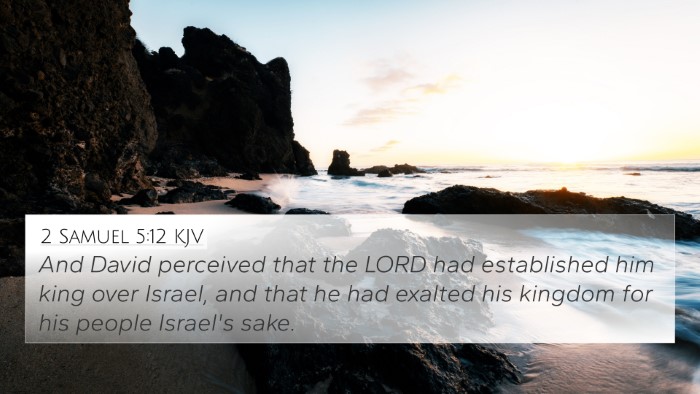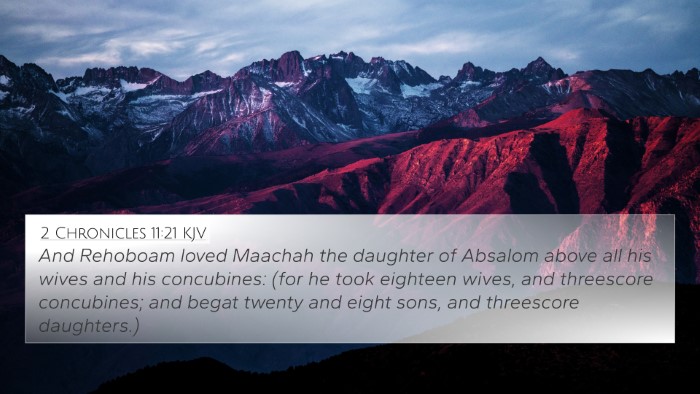Understanding 2 Chronicles 13:21
Verse: "But Abijah grew mighty, and married fourteen wives, and begat twenty and two sons, and sixteen daughters." (2 Chronicles 13:21)
Summary of the Verse Meaning
This verse describes how Abijah, the king of Judah, became strong and influential during his reign. His actions of marrying multiple wives and fathering many children highlight the cultural practices of the time, showcasing not only personal prosperity but also the political alliances formed through marriage. The mention of his numerous sons and daughters indicates the potential for a strong dynasty.
Commentary Insights
According to Matthew Henry, this verse illustrates the significance of Abijah's reign and the blessings of God upon him. Abijah's "growing mighty" suggests both military success and the establishment of a solid lineage. In marrying multiple wives, he exemplifies a common practice among kings intended to secure political alliances.
Albert Barnes adds that Abijah's actions reflect the dynastic nature of ancient Israelite kingship. The number of children he fathered indicates not just personal wealth but also a strategy for strengthening his kingdom's future through a large family, which would play a critical role in succession and political stability.
Adam Clarke emphasizes the implications of having multiple wives, suggesting that while this practice was rampant among kings, it often led to complications and challenges within families, as seen throughout biblical narratives. Clarke also notes that the blessings Abijah received were not without challenges, pointing toward a narrative theme of human struggle despite divine favor.
Cross-References Related to 2 Chronicles 13:21
- 1 Kings 15:2 - Discusses the lineage of Abijah and his father.
- 2 Chronicles 11:21 - Describes Rehoboam's actions and family.
- 2 Samuel 5:13 - References David's multiple wives.
- 1 Chronicles 3:10-12 - Lists descendants of David, highlighting dynastic relevance.
- Matthew 1:12 - The genealogy of Jesus, connecting to kings of Judah.
- 1 Kings 14:31 - Provides context on Rehoboam's family and political struggles.
- Ezra 9:2 - Addresses intermarriage and cultural implications among Israelites.
Thematic Connections
This verse presents rich themes for consideration:
- Dynastic Strength: The emphasis on family expansion speaks to the importance of lineage in governance.
- Cultural Practices: Marrying multiple wives was a norm for kings to form alliances.
- Divine Favor: The narrative context suggests Abijah's strength was linked to God's blessings.
- Challenges of Succession: The large family also invites discussion about the difficulties in ruling with many heirs.
Reflection on Inter-Biblical Dialogue
2 Chronicles 13:21 also opens avenues for exploring the connections and parallels between various biblical texts:
- The intersections with New Testament genealogies establish continuity from the Old to the New Testament.
- Comparative studies of kingship in Israel highlight recurring themes of power and morality.
- Understanding the role of women in these marriages enhances comprehension of cultural norms.
Tools for Bible Cross-Referencing
To further explore the connections and themes highlighted in this verse, consider utilizing the following tools:
- Bible Concordance: A useful resource to locate similar terms and narratives throughout scripture.
- Bible Cross-Reference Guide: Helps in finding verses that relate thematically or contextually.
- Cross-Reference Bible Study: Useful for understanding deeper relationships between scripture passages.
Conclusion
2 Chronicles 13:21 serves as a significant verse that illustrates both the nature of kingship in ancient Israel and the implications of familial ties. The study of this verse through the lenses of various commentaries and the connections with other biblical texts enriches our understanding of God's purpose and the challenges faced by leaders. Through careful cross-referencing and study, one can uncover the profound narratives woven throughout Scripture.
